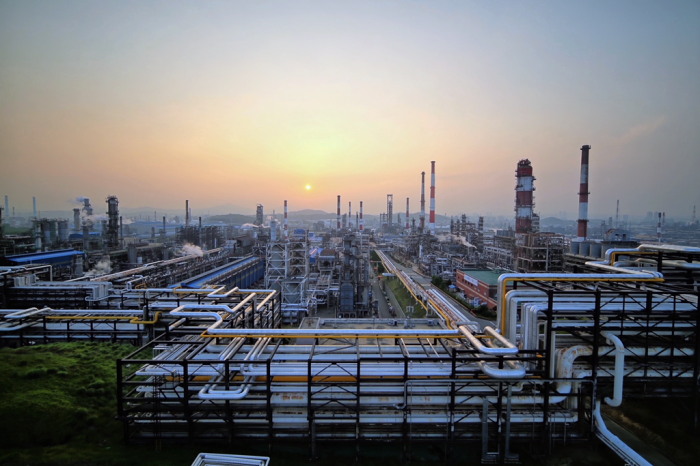Listed firms’ earnings
Korean firms emerge triumphant from pandemic with record Q1 profits
Outlook bright but monetary policy changes could hurt equities markets
By May 21, 2021 (Gmt+09:00)
3
Min read
Most Read
LG Chem to sell water filter business to Glenwood PE for $692 million


Kyobo Life poised to buy Japan’s SBI Group-owned savings bank


KT&G eyes overseas M&A after rejecting activist fund's offer


StockX in merger talks with Naver’s online reseller Kream


Mirae Asset to be named Korea Post’s core real estate fund operator



South Korean companies have posted their best-ever quarterly sales and operating profits, emerging from a year-long slump caused by the global COVID-19 pandemic.
The country’s 593 companies listed on the main Kospi market reported combined revenue of 538.3 trillion won ($478 billion) on a consolidated basis in the first quarter, up 9.1% from the year-earlier period, according to data compiled by the Korea Exchange on May 20.
Their combined operating profit increased 131.7% on year to 44.4 trillion won.
The listed firms’ net profit jumped 361% to a combined 49.1 trillion won.
Analysts attributed the Korean companies’ record results to a low base of comparison due to the pandemic slump last year, but said rising demand amid signs of a global economic recovery also boosted sales and profitability.
Last year, companies in the bio, batteries, Internet and gaming (BBIG) industries led growth in the stay-at-home non-contact era.

GROWTH LED BY SMOKESTACK INDUSTRY
But in the first quarter of this year, manufacturers such as automakers, steelmakers, refiners and chemicals companies -- commonly known as the smokestack industry – showed improvement, signaling a rebounding economy.
Among the top 20 firms with the highest operating profits are market leader Samsung Electronics Co., Korea’s two largest automakers Hyundai Motor Co. and Kia Corp., steelmaker POSCO, and LG Chem Ltd.
Excluding Samsung Electronics, which accounted for 12% of all Kospi-listed firms in terms of sales, Korean companies reported a combined first-quarter operating profit of 35 trillion won, up 175% from a year ago.
Their net profit ex-Samsung increased 628% to 42 trillion won.
The operating income of 42 financial companies reached 13.68 trillion won, up 89%, while their net earnings rose 95% to 10.42 trillion won.
Companies on the junior Kosdaq market also performed well in the first quarter.
The combined revenue of 1,011 Kosdaq-listed companies stood at 53.28 trillion won, up 12.3% from the year-earlier period.
While their operating profit rose 98.3% to 3.57 trillion won, net income increased 239% to 3.59 trillion won.
As most companies posted improved earnings in the first quarter, the main bourse’s benchmark Kospi index rose to the highest level last week.
On May 10, the index closed at 3,249.29, up 13% from the start of the year, powered by economically sensitive stocks such as transportation, brokerage and retail companies.
OUTLOOK BRIGHT, BUT UNCERTAINTY REMAINS
Market analysts said Korean companies will continue to post handsome growth for the rest of the year, but warned that rising prices of raw materials such as iron ore, copper and crude oil could push up manufacturing costs.

Automakers, which have been suffering from an automotive chip shortage, could see a rise in car sales prices if demand picks up, they said.
Oh Hyun-suk, head of research at Samsung Securities, said investors tend to favor economically sensitive stocks over defensive shares, and value stocks over growth stocks at a time when interest rates are set to rise.
Analysts said if the US begins tapering (slowdown of central bank asset purchases) to absorb market liquidity, it could hurt equities markets across the globe.
“The outlook for the Korean stock isn’t bad. But uncertainty remains over possible central bank policy changes in Korea and the US,” said Jung Yong-taek, head of research at IBK Investment & Securities.
Write to Jae-Yeon Ko at yeon@hankyung.com
In-Soo Nam edited this article.
More to Read
-
 EarningsPOSCO revises up sales target after Q1 profit rises to 10-year high
EarningsPOSCO revises up sales target after Q1 profit rises to 10-year highApr 26, 2021 (Gmt+09:00)
3 Min read -
 Korean music labelsBlackpink label YG delivers Q1 earnings surprise; 90% above market consensus
Korean music labelsBlackpink label YG delivers Q1 earnings surprise; 90% above market consensusMay 14, 2021 (Gmt+09:00)
2 Min read -
 Doosan GroupDoosan Group pushes painful restructuring, bears fruit in Q1
Doosan GroupDoosan Group pushes painful restructuring, bears fruit in Q1May 06, 2021 (Gmt+09:00)
4 Min read -
 EarningsHyosung units post record Q1 earnings, justifying high valuation
EarningsHyosung units post record Q1 earnings, justifying high valuationMay 03, 2021 (Gmt+09:00)
3 Min read -
 EarningsSamsung reports highest Q1 revenue, expects chip rebound in Q2
EarningsSamsung reports highest Q1 revenue, expects chip rebound in Q2Apr 29, 2021 (Gmt+09:00)
4 Min read
Comment 0
LOG IN


